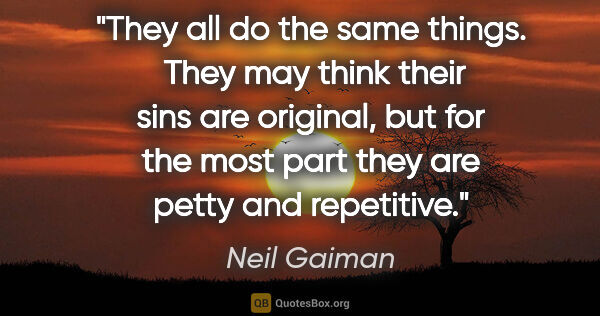Originated Quotes (page 23)
It is never too late to revive your origins. It is their destiny: since they were not the first to be in on history, they will be the first to immortalize everything by reconstitution (by putting things in museums, they can match in an instant the fossilization process nature took millions of years to complete). But the conceptions Americans have of the museum is much wider than our own. To them, everything is worthy of protection, embalming, restoration. Everything can have a second birth,...
Jean Baudrillard
I look around at this world you're so eager to be a part of and all I see is six billion lunatics looking for the fastest ride out. Who's not crazy? Look around, everyone's drinking, smoking, shooting up, shooting each other, or just plain screwing their brains out 'cause they don't want 'em anymore. I'm crazy? Honey, I'm the original one-eyed chicklet in the kingdom of the blind, 'cause at least I admit the world makes me nuts.
Joss Whedon
in addition to the conditions under which life is given to man on earth, and partly out of them, men constantly create their own, self-made conditions, which, their human origins notwithstanding, possess the same conditioning power as natural things. whatever touches or enters into a sustained relationship with human life immediately assumes the character of a condition of human existence. this is why men, no matter what they do, are always conditioned beings. whatever enters the human...
Hannah Arendt
...Desire, a function central to all human experience, is the desire for nothing nameable. And at the same time this desire lies at the origin of every variety of animation. If being were only what it is, there wouldn’t even be room to talk about it. Being comes into existence as an exact function of this lack.
Jacques Lacan
The girl's life had been squandered in the streets, and among the most noisome of the stews and dens of London, but there was something of the woman's original nature left in her still; and when she heard a light step approaching the door opposite to that by which she had entered, and thought of the wide contrast which the small room would in another moment contain, she felt burdened with the sense of her own deep shame: and shrunk as though she could scarcely bear the presence of her with...
Charles Dickens

As a Scot and a Presbyterian, my father believed that man by nature was a mess and had fallen from an original state of grace. Somehow, I early developed the notion that he had done this by falling from a tree. As for my father, I never knew whether he believed God was a mathematician but he certainly believed God could count and that only by picking up God's rhythms were we able to regain power and beauty. Unlike many Presbyterians, he often used the word "beautiful.
Norman Maclean
But are there philosophical problems? The present position of English philosophy - my point of departure - originates, I believe, in the late Professor Ludwig Wittgenstein's doctrine that there are none; that all genuine problems are scientific problems; that the alleged propositions or theories of philosophy are pseudo-propositions or pseudo-theories; that they are not false (if they were false, their negations would be true propositions or theories) but strictly meaningless combinations of...
Karl Popper
You know, they straightened out the Mississippi River in places, to make room for hourse and livable acreage. Occasionally the river floods these places. "Floods" is the word they use, but in fact it is not flooding; it is remembering. Remembering where it used to be. All water has a perfect memory and is forever trying to get back to where it was. Writers are like that: remembering where we were, that valley we ran through, what the banks were like, the light that was there and the...
Toni Morrison
But if we betray B., for whom we betrayed A., it does not necessarily follow that we have placated A. The life of a divorce-painter did not in the least resemble the life of the parents she had betrayed. The first betrayal is irreparable. It calls forth a chain reaction of further betrayals, each of which takes us farther and farther away from the point of our original betrayal.
Milan Kundera
